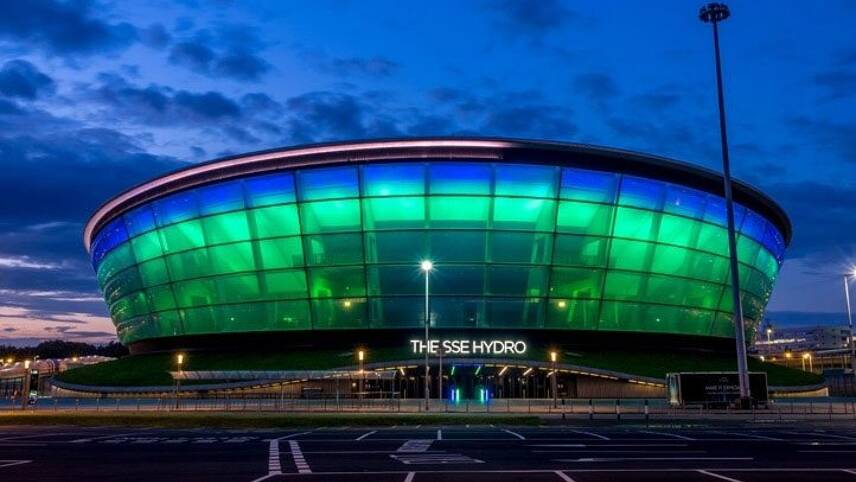Register for free and continue reading
Join our growing army of changemakers and get unlimited access to our premium content

Pictured: The SSE Hydro Arena in Glasgow
The UK’s COP26 unit revealed this week that 30 of the FTSE100 firms have joined the campaign. This means that joining among this cohort has doubled within five months.
In joining Race to Zero, corporates commit to setting more ambitious targets in line with climate science and to using their reach to encourage climate action across their networks. This includes suppliers, customers and their respective sectors. FTSE100 signatories represent a range of sectors, from retail (Sainsbury’s, Tesco, JD Sports), healthcare (AstraZeneca), telecommunications (BT, Vodafone), the built environment (British Land) and consumer goods (Unilever).
According to the UK’s COP26 unit, FTSE100 signatories to Race to Zero represent a total market capitalization of £650m. This is before smaller businesses, non-listed firms and businesses covered by industry collaborations, like Water UK’s net-zero by 2030 roadmap, are accounted for.
Globally, more than 2,000 companies have joined the Race to Zero to date. The UK Government has stated that UK businesses are “at the front of the pack internationally” on climate change, but that it would like to see more businesses planning to meet or exceed the legally binding net-zero target for 2050.
“Businesses wield incredible influence to drive change across society and the economy – we need to harness this power to fight climate change,” Business and Energy Secretary Kwasi Kwarteng said.
“UK businesses are already leading the way in cutting carbon emissions and building back greener – it is fantastic to see so many of our biggest companies already pledging to reach net zero.
“But more can be done, and so today I am calling on more fantastic British companies to step up, follow suit and pledge to join the fight against climate change.”
Plan for Growth post-Covid-19
The update on corporate Race to Zero membership comes as Kwarteng, along with Chancellor Rishi Sunak and Prime Minister Boris Johnson, publishes an open letter to businesses on the Government’s plan for economic growth in the context of the Covid-19 recovery.
The joint letter reiterates the Government’s position on “Building Back Better”, stating that it wishes to couple pandemic recovery with other “key government priorities” including net-zero and the levelling up agenda.
Citing measures included in the 2021 Budget and the updated Industrial Strategy, the letter states that the Government will take a three-pillar approach to allocating its own funding and encourage the private sector to do the same. The pillars are infrastructure, innovation and skills.
The letter confirms that existing Sector Deals will be delivered to the timescales and scales agreed pre-pandemic – but stipulates that the Government changed the Industrial Strategy to only take forward the “best elements” and to deliver better alignment with net-zero.
Business representatives are due to meet with Sunak, Kwarteng and Johnson virtually today in a second meeting of the ‘Build Back Better Business Council’. It is understood that the discussion will help Ministers develop sector-specific targets and supports beyond the broad three investment pillars.
“Today’s Council meeting will particularly look at the innovation pillar of the Plan for Growth and discuss the government’s upcoming Innovation Strategy, due to be published this Summer,” the letter states.
The development of new ideas, products and processes, and unlocking the finance to pursue these, will put the UK at the forefront of new opportunities for growth and will be crucial to delivering key priorities such as transitioning to net-zero by 2050.”
Priority innovation areas include battery technology for vehicles and energy storage; green hydrogen production and vehicles, planes and ships that run on hydrogen.
Ahead of the council meeting, the Government has confirmed new funding across these areas totalling some £31m. £9m will be spent on academic research into lithium recycling and magnet manufacturing for electric vehicles, and into the suitability of lightweight hydrogen storage for cars and vans. £22.6m, meanwhile, will be allocated by the Faraday Institution to improve battery safety, reliability, weight and recyclability.
Join the conversation at edie’s Countdown to COP26
Registration is now open for a brand-new edie event which aims to seize the opportunity of the UN’s COP26 climate summit later this year, with a stellar speaker line-up including senior representatives from BEIS, ClientEarth, Green Alliance, We Mean Business and the High-Level Champions for Climate Action.
Called ‘Countdown to COP26’, the event is taking place in a virtual format on May 20. Full information on the speaker line-up and registration for individuals and exhibitors can be found here.
Sarah George


Please login or Register to leave a comment.